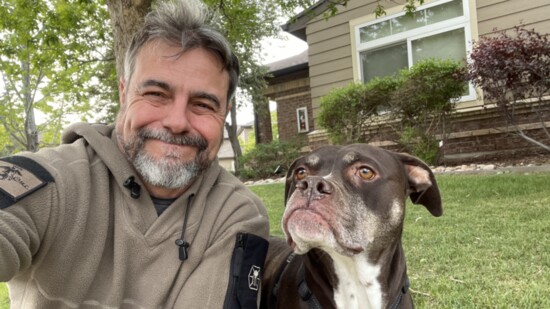Veteran Services Coordinator, Chris Boyer pleads a mission of healing and support for veterans through his work at Freedom Service Dogs of America (FSD). An organization since 1987 FSD committed to serve the veteran community in 2007 and their program is changing lives. They also serve first responders and active duty military.
A veteran himself, I had the honor of meeting not only Chris, but his service dog and companion, Noodle. Chris comes from a long line of veterans leading back to the revolutionary war.
“Noodle right here has changed my life,” Chris shares.
A fascinating process, when the puppies are eight weeks old, they are vaccinated and transferred to local prisons where they spend several weeks being trained by inmates in the Prison Trained K9 Companion Program. These puppies on a mission learn the basics of potty training, and commands like sit, stay, down and more.
“They come back to the facilities the most amazing well-behaved puppies you've ever seen in your entire life. It's incredible,” Chris applauds.
At this point in training, “They’re exposed to real life things like sirens, music, the sounds of pots and pans and you know, regular noises in everyday life, kids and all that… we even have cats on site,” Chris explains.
“From there, we have puppy raisers (and we always need more puppy raisers). They basically take a puppy home to live with them for about a year. They're trained on how to train dogs and the puppies are brought back periodically for testing.”
At this point, it becomes obvious which puppies are not going to become service dogs. They end up becoming pets and most often stay with the one raising them already.
After the raising period, “They come back to the facility where for about six months, they get more extensive training,” Chris shares.
For veterans who have filled out an application and gone through the interview process, this is where their needs are considered.
“During the application process we get to know the veteran as much as possible,” Chris says. Getting to know the veteran is vital as training becomes specialized.
“At this stage of the process, we're looking at the dog and our veterans and we're trying to make that perfect match. Once we make the match, then the dog is custom trained to the veteran's specific needs. So maybe they're an amputee and they need that dog to assist picking things up… they're being trained specifically for that veteran. And they go through a two-week course and they graduate.”
The relationship doesn't end here. After a touching graduation ceremony, FSD continues to bring support and training if needed.
“It changes a life,” Chris shares that this bond between dog and veteran provides, “a sense of calming, happiness, having someone you can rely on, [experience] unconditional love, an unbreakable bond.”
“There's a lot of pain out there. I think as a society we need to do a better job.” Chris encourages us to make a difference in the ways we can.
While donating, attending events and volunteering all change lives, Chris simplifies how you can help. He says, “If [you've] got a friend or a neighbor that's a veteran, shake their hand, ask how they're doing. If [you're] really, really worried about a veteran, dial 988…. talk to a professional about it.”
You can find out more at FreedomServiceDogs.org
